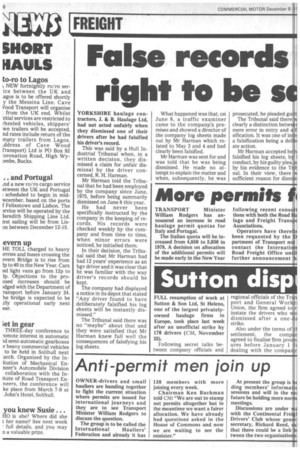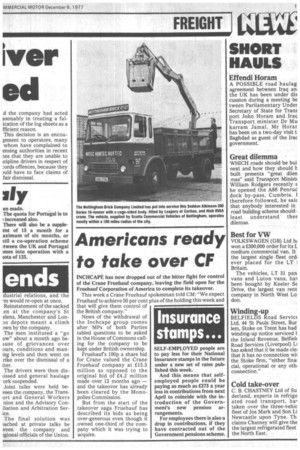False records right to be s
Page 20

Page 21

If you've noticed an error in this article please click here to report it so we can fix it.
iye, ed
YORKSHIRE haulage contractors, J. & B. Haulage Ltd, had not acted unfairly when they dismissed one of their drivers after he had falsified his driver's record.
This was said by a Hull Industrial Tribunal when, in a written decision, they dismissed a claim for unfair dismissal by the driver concerned, R. H. Harman.
Mr Harman told the Tribunal that he had been employed by the company since June, 1975, before being summarily dismissed on June 8 this year.
He had never been specifically instructed by the company in the keeping of records. His records were checked weekly by the company and from time to time, when minor errors were noticed, he initialled them.
In their decision, the Tribunal said that Mr Harman had had 12 years' experience as an hgv driver and it was clear that he was familiar with the way driver's records should be kept.
The company had displayed a notice in its depot that stated "Any driver found to have deliberately falsified his log sheets will be instantly dismissed."
The Tribunal said there was no "maybe" about that and they were satisfied that Mr Harman knew full well the consequences of falsifying his log sheets. What happened was that, on June 8, a traffic examiner came to the company's premises and showed a director of the company log sheets made out by Mr Harman which related to May 3 and 4 and had clearly been falsified.
Mr Harman was sent for and was told that he was being dismissed. He made no attempt to explain the matter and when, subsequently, he was prosecuted, he pleaded gu The Tribunal said there clearly a distinction betw mere error in entry and sification. It was one of in a falsification being a del ate action.
Mr Harman accepted h falsified his log sheets, b conduct, by his guilty plea by his evidence to the T nal. In their view, there sufficient reason for dis d the company had acted asonably in treating a falication of the log sheets as a fficient reason.
This decision is an encougement to operators, many whom have complained to ensing authorities in recent nes that they are unable to icipline drivers in respect of :.ords offences, because they )uld have to face claims of fair dismissal.




































































































